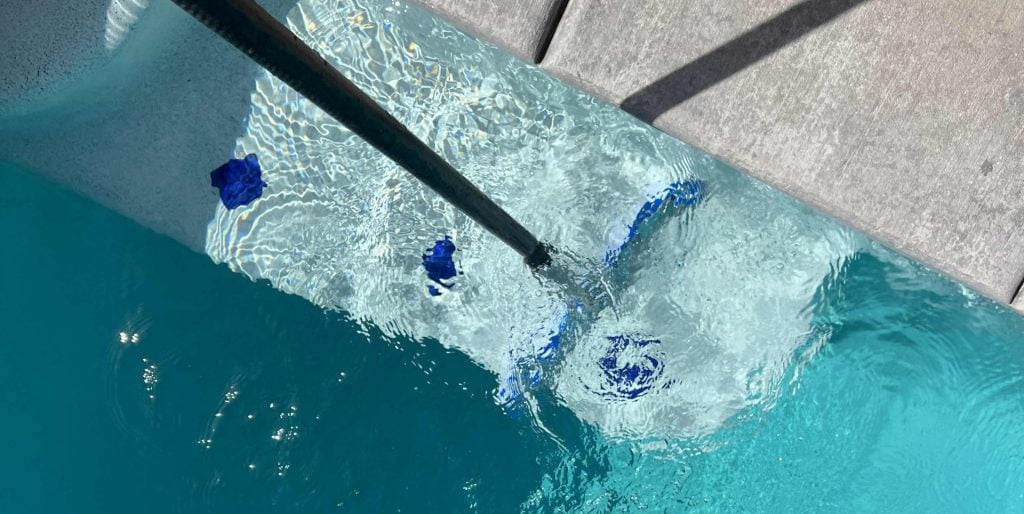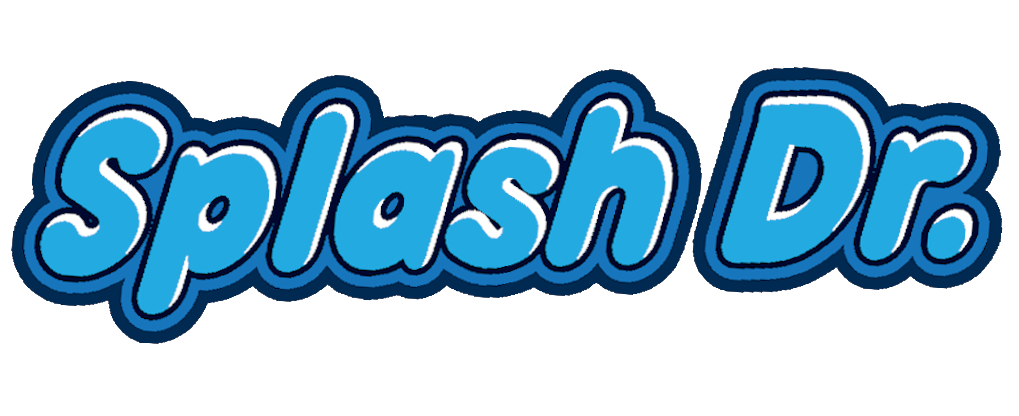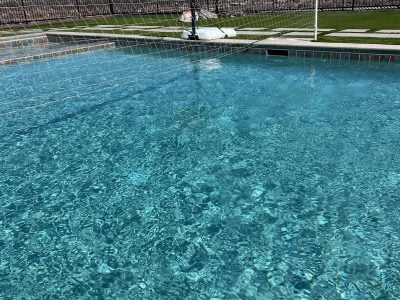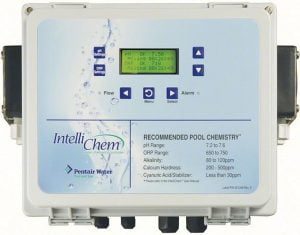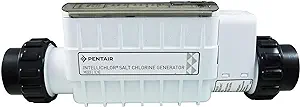We offer weekly, biweekly, or monthly pool service in St. George, Ut, and the surrounding areas. To keep your pool clean, safe, and sanitary we always recommend our weekly service. Our weekly pool service includes water testing, chemical balancing, leaf skimming, walls, steps, and bench brushing, skimmer basket cleaning, pump basket service, and equipment and plumbing inspection.
In addition to our included weekly service items, we offer vacuuming, filter cleaning, equipment repair, equipment replacement, saltwater generator cleaning, and more. If your pool needs anything, call Splash Doctor today to schedule a free, no-obligation consultation. If you would like an instant quote online for pool service in St. George or any of the surrounding cities, fill out the following information.
What is included in Splash Doctor’s weekly pool service in St. George, Ut
At Splash Doctor we offer weekly pool service in St. George, Ivins, Washington, Hurricane, and everywhere in between. We take all the hassle out of your swimming pool maintenance and ensure your pool is always ready to go. Included in your weekly pool service in St. George, UT are the following:
- Initial pool overview photo
- Swimming pool water chemistry check
- Chemical Adjustments
- Pool surface water skimming
- Pool floor leaf and debris netting
- Tile and waterline cleaning
- Skimmer basket emptying and cleaning
- Overall swimming pool function check
- Equipment pad inspection and photos
- Pool pump basket cleaning
- Pool pump servicing
- Pool valve operation and configuration
- Plumbing inspection and photos
- Before and after photos
Initial pool service overview photo
When our pool service technician arrives on-site at your swimming pool, they will get an overview of the current condition of your pool. If you have a cover they will check it for water, debris, or anything else that could cause damage to the pool cover. In the colder months experienced in the St. George area, we check for any standing water that has frozen. Frozen water on a pool cover can slice the cover like tissue paper. Our technician will take a photo of your cover so you are aware of the condition of everything upon our arrival. For any issues such as standing water, ice, branches, sticks, or debris our technician will remedy them before opening the pool.
Swimming pool service water chemistry check
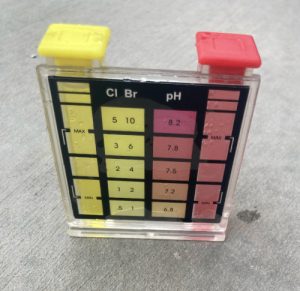
After opening your pool your Splash Doctor pool technician will test your water chemistry. They will check the pool water for the following levels;
- Free Chlorine
- Combined Chlorine
- pH
- Alkalinity
- Calcium Hardness
- Salt Level/Total Dissolved Solids
- Cyanuric Acid Level
- Temperature
Free Chlorine
Whenever a person thinks of pool maintenance, they think, “I need chlorine in my pool to prevent algae”. While it is true that chlorine is essential to a safe, clean, algae free pool, it is just one of the factors Splash Doctor will check during your weekly pool service in the St. George Utah area.
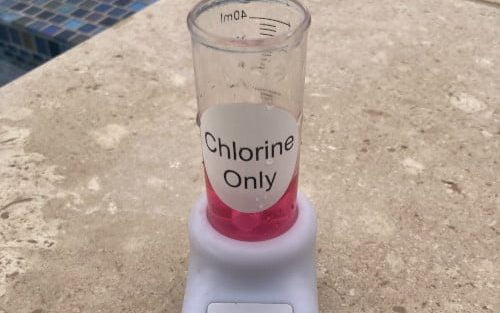
Free chlorine is the total amount of sanitizer that is in your pool. A swimming pool with zero chlorine is a perfect breeding ground for algae, bacteria, and disease. At Splash Doctor, as part of your Pool Service in St. George, we ensure you not only have the proper level of free chlorine in your pool but that you have a method of distribution during the week.
What this means is if you have a salt cell, we check to ensure proper operation. If you have a tablet tower, we make sure it is always topped off with tablets. If you have a sense and dispense or intellichem system we make sure the supply barrels of chlorine are sufficiently full for another week of sanitizing. If you do not have any of the automated chlorine distribution methods, we will put a tablet floater in your swimming pool and make sure it has sufficient chlorine for the week.
What we will not do if we find that your pool has zero chlorine, is put tablets in your skimmer. If your current pool company just drops tablets in your skimmer it is time to shop around for new pool service in St. George, UT. This can damage your expensive swimming pool equipment and cause havoc in your water chemistry.
If we test your pool and your chlorine level is at zero, we will provide a shock dosage of calcium hypochlorite. This will temporarily elevate your chlorine levels to the point that algae and bacteria are killed. We also will diagnose the situation and find out why you ended up with zero chlorine. If it is due to a faulty salt cell or tablet feeding system, we will resolve the issue during the service. Occasionally things break in swimming pools and your chlorine distribution system is not immune to this. If we need more time or expertise than the weekly service provides, we will coordinate with you to schedule a time to have our pool repair tech come out and fix the problem. In the meantime, we will put in a tablet floater and ensure the chlorine stays at a safe level.
Combined Chlorine
When checking your pool chlorine during a weekly pool service visit, it is important to not only test free chlorine but combined chlorine or chloramines. Combined chlorine is the chlorine that your pool has already used up. After chlorine is used to fight algae, bacteria, or other organic material in your pool it turns into a non-sanitizing state called chloramine. When too many chlorine particles are used up and no longer have a sanitizing power, your combined chlorine level will become elevated.
As part of your St. George pool service, we will test for combined chlorine. If we see that your combined chlorine level is above .5 we will shock your pool to bring the combined chlorine level back down. This ensures there are plenty of good sanitizing chlorine present to keep the algae and bacteria away.
pH
The level of water acidity is referred to as pH. A Splash Doctor pool technician always checks pH. A normal level is between 7.2-7.8. During our pool service visit, we will ensure your pH remains in this range. There are some dangers associated with both too high and too low pH levels.
pH level is too low
- The pool is too acidic
- Skin irritation
- Eye irritation
- Equipment damage
- Plaster damage
- Metal corrosion and damage
pH level is too high
- The swimming pool is too base
- Skin irritation
- Eye irritation
- Itchy skin
- Calcium scaling
- Chlorine neutralization or weakening
- Pool equipment corrosion
- Pool water cloudiness
As part of our weekly swimming pool service in St. George, we ensure your pH is at the proper level. For saltwater pools, we keep the pH on the lower end between 7.2-7.4. This helps keep the salt cell from scaling and keeps the plaster surfaces clean. If it is a traditional chlorine pool we will keep your pH at 7.5. The reason we like 7.5 is because the tears in the human eye are at a pH of 7.5. This means if you are swimming in water that has the same pH, it causes less discomfort and redness in your eyes.
Alkalinity
During your weekly swimming pool service visit, a Splash Doctor pool technician will check the total alkalinity. Alkalinity is the measurement of alkaline particles in your pool water. These particles can be bicarbonates and hydroxides. These particles are present to provide a pH buffer. What this means, is a correct alkalinity will help prevent extreme pH fluctuations. Without a proper alkalinity level, your pH can swing from above 8 down to the 6’s in a very short time. It can cause chlorine ineffectiveness, skin and eye irritation, scaling, and all the other issues with high and low pH levels.
pH is the acidity of your pool water, but alkalinity is what keeps the acidity in check.
Calcium Hardness
At Splash Doctor, we have the water hardness level in St. George, UT tap water to be extremely high. It is not uncommon to find hardness levels above 250 out of the tap. What this means is keeping calcium levels within the recommended range is even more difficult in the St. George, UT area. We will test the calcium hardness each visit and change what types of shock and chlorine types we will use. If your calcium is getting up above 450PPM we will stop using Calcium Hypochlorite on your pool. This will ensure we do not add to the problem of excessively hard water.
Occasionally we have found with some pools in the St. George, Ut area, the calcium level is slightly below the recommended amount. To prevent this deficiency from pulling calcium out of your plaster we have calcium hardness increase. It is rarely used and will only be used to get your swimming pool to the minimum required level.
W
Salt Level/Total Dissolved Solids
If your swimming pool uses a salt water generator to create chlorine, our weekly swimming pool service tech in St. George, UT will check the salt level. This is a value presented in PPM. We try to keep it between 2800 and 3800 PPM. This is the recommended level to efficiently operate a salt cell. Salt does not get “used up” in the pool but occasionally enough splash and draining will cause your salt level to decline. We add pool salt to bring your pool back up to the required level.
Cyanuric Acid Level
Cyanuric acid is a chlorine stabilizer. We use cyanuric acid (CYA) to help keep the chlorine usable in your swimming pool in the heat of the summer.
One of the benefits of cyanuric acid is also its downfall. CYA is used to help prevent all the chlorine from being burned up by the sun’s rays. It is what is called a chlorine buffer. The benefit is that at normal CYA levels of 40-100 PPM, the chlorine level in your pool will stay at a reasonable level, and the CYA will help prevent it from burning off too quickly. The problems arise when your CYA level creeps up to above 100. At 100 CYA your free chlorine level should be 7.5% of that or 7.5PPM. If you get up to 120, 130, 150, or higher the free chlorine level to keep your pool sanitized is just too high. You will require massive amounts of chlorine tablets, liquid chlorine, or shock just to maintain a swimmable level of chlorine in your pool.
At Splash Doctor, when we service your swimming pool in St. George, UT we will first ensure your CYA level is in the acceptable range. If your level is above or below this range we will correct it.
If the CYA level is too low, we can add dichlor shock or powdered cya to help increase this. If it is too high we will drain and refill a portion of your water.
The following calculator will show what level your swimming pool chlorine should be, based on how high your CYA level is. Typically maintaining a free chlorine level at 7.5% of your CYA is the minimum. For instance, if your swimming pool is at 50PPM CYA your free chlorine level should be around 3-4PPM at a minimum. A safe recommended level would be 6-8PPM.
For salt water pools, a free chlorine level of 5% of your CYA is the minimum. The following calculator takes all of this into accound.
Temperature
Whenever we complete a weekly pool service on your home in Southern Utah, we will test the temperature. There are several reasons temperature is important.
The first reason temperature may be important in your swimming pool is if you have a salt cell to produce chlorine. Saltwater generators only produce chlorine at water temperatures above 58 degrees. What this means is if your pool is colder such as happens often in November through March in St. George, UT we will need to supplement the chlorine production. At Splash Doctor we do this by adding liquid chlorine during our weekly visits, and by refilling a floating tablet feeder.
The second reason to check the temperature would be if a weekly pool service customer requests us to set the temperature. We always want to be able to provide information to our pool service clients whenever they need it. You will be sent a weekly report that covers all tests taken during your visit and you can reference this information anytime you need to know the status of your swimming pool.
The third reason would be if you are having issues with any of your heating or cooling equipment. We can test the temperature with a digital thermometer and cross-check it with your heater temperature. This will let us know if it is at least reading temperature properly.
Proper chemical adjustments is part of providing quality pool service in St. George, UT.
At Splash Doctor we developed all our chemical adjustment calculators in-house. This means that we know the data and the recommended dosages from the manufacturer. We have built a reliable, efficient calculator to determine what is needed in each swimming pool service we complete in St. George, UT.
Pool maintenance in St. George, Ut includes surface water skimming
